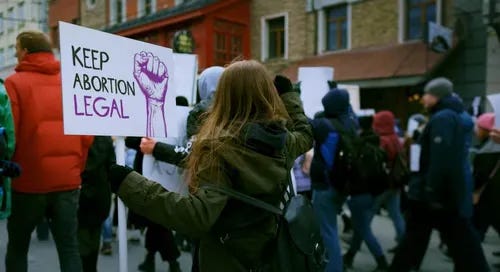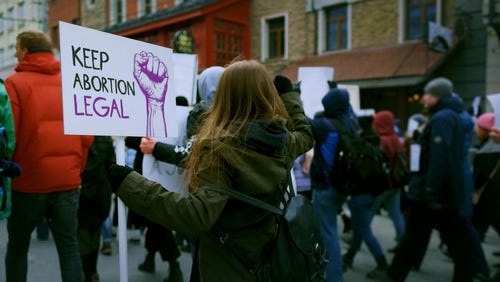Abortion rights is — in part — a capitalism issue
Capitalism commodifies everything, including women's bodies.
At the time of this writing, law enforcement alleges that 57-year-old Vance Boelter murdered State Representative Melissa Hortman and her husband in cold blood. They also allege that he shot State Senator John Hoffman and his wife in an attempt to assassinate them too.
Given that Hortman and Hoffman were both pro-choice, and Boelter allegedly had a hit list of pro-choice targets including Planned Parenthood locations, a reasonable person can surmise that if Boelter murdered these people, it was because he opposes abortion rights.
Let’s explore how Boelter’s hostility to women’s rights is linked to capitalism.
First, here is how they are not linked; there is no secret plot, as conspiracy theorists allege, to restrict abortion access so as to control the work force and consumer base. While this idea may seem appealing to those who vilify capitalists indiscriminately, it is too cute by half. There is no evidence that abortion regulations impact either the labor or consumer bases in this way… but there is evidence for something else.
“While bringing capitalist political economy into the abortion debate is undoubtedly necessary, the ‘labor supply’ argument is a spurious one,” Heideman writes. “It misses that abortion bans are an inefficient means to control the labor supply and fails to explain why so many women in US society have a deep investment in antiabortion politics.”
Presciently, he adds that “instead, the key to understanding the “pro-life” movement is grasping how capitalism creates inequality between men and women (as well as among women), and the politics that flow from this. Antiabortion politics aren’t ultimately a capitalist plot. But they are a consequence of the brutal inequalities capitalism creates.”
Because capitalism creates gaping income inequality, men and women who are less affluent and less well-educated often value motherhood as something sacred and identity-defining — and in a way that precludes alternatives, often with great hostility. When abortion makes motherhood optional rather than required, these individuals will for class reasons oppose abortion rights. As scholar Stephanie Coontz pointed out:
“Women with less economic or personal autonomy are often drawn to a culture of family values that emphasizes men’s responsibility to look after women,” Coontz said. “Women who have a shot at achieving or competing on their own emphasize equality, supporting the kind of policies that make it possible for them to move up in their jobs and combine work and family.”
Men are also influenced by these strains of thinking. As Laura Basu writes for Open Democracy:
“I’m 27 weeks pregnant,” Basu said. “A couple of months ago I was having what lunch I could keep down with a friend – let’s call him Tim. We were talking about the overturning of abortion rights in the US.”
Despite being “fairly liberal” and supporting abortion rights in the Netherlands, Tim insisted “someone needs to look out for the rights of the ‘unborn babies’.”
As Basu recalled, “‘This foetus is part of my body and I should have autonomy over my own body,’ I said, making the basic pro-choice argument. ‘It’s not part of your body, it’s in your body,’ Tim replied.”
The notion that women’s bodies can be thereby easily commodified — that as soon as arbitrary third parties claim, in defiance of medical consensus, that a blob of cells known as a fetus has “rights,” a woman loses her bodily autonomy — that, right there, is the heart of capitalist thinking.
“The states banning abortion rights have, over decades, intentionally constructed an economic policy architecture defined by weak labor standards, underfunded and purposefully dysfunctional public services, and high levels of incarceration,” EPI writes. “Through a cross-sectional quantitative analysis of state level abortion access status and five indicators of economic security—the minimum wage, unionization, unemployment insurance, Medicaid expansion, and incarceration—we find that, generally, the states enacting abortion bans are the same ones that are economically disempowering workers through other channels.”
To be clear, I’m not discounting the roles of patriarchal thinking, religious extremism, and simple misogyny in fueling anti-abortion politics. Without acknowledging the role of capitalism, however, any analysis of the issue is devastatingly incomplete.
Back Seat Socialism
Column by Matthew Rozsa who is a professional journalist for more than 13 years. Currently he is writing a book for Beacon Press, "Neurosocialism," which argues that autistic people like the author struggle under capitalism, and explains how neurosocialism - the distinct anticapitalist perspective one develops by living as a neurodiverse individual - can be an important organizing principle for the left.




